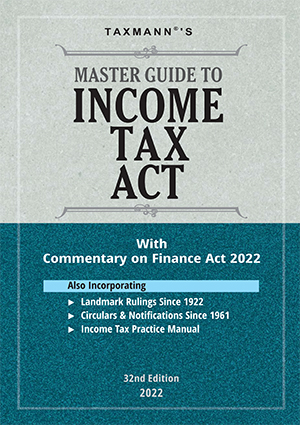What is Income Tax Act 1961? Types and Heads of Income Tax
- Blog|Income Tax|
- 4 Min Read
- By Taxmann
- |
- Last Updated on 26 August, 2022
Income Tax Act, 1961
Previous Year:
For Income Tax Act 1961, the previous year is defined as the financial year which immediately precedes the assessment year. In case the source of income is new or the business set up is new, the previous year for that entity will start from the date of setting up of that business or profession or from the date when the source of income of this new existence starts and ends in the said financial year.
The exception to Previous Year:
-
- Income of a person who is leaving India for a long period or permanently
- Income of a person who is trying to alienate his assets with an intention to avoid taxes
- Income of a discontinued business
- Income of non-resident shipping companies who don’t have any representative in India
Scope to Total Income:
As per the Income Tax Act 1961, the total income of the previous year for a person who is a resident of India will include all his income irrespective of the source of that income which is either received or has accrued in India in the previous year.
However, if a person is not an ordinarily resident in India as per Section 6 of Income Tax Act, 1961, income from the sources which accrues or arises for him outside India shall not be included in total income. In respect of non-residents, any income which is received or arises in India is taxable in India.
Heads of Income Tax:
-
- Salaries
- Income from house property
- Profit and gains of business or profession
- Capital gains
- Income from other sources
Types of Taxes:
1. Direct Tax
2. Indirect Tax.
Indirect taxes are the types of taxes where the person depositing the tax with the government and the person actually having been burdened by the tax are different. Generally, these taxes are included in the prices of the goods or services which are provided to the people, and then such taxes are deposited by the person collecting the same from their customers. GST is one of the most popular types of indirect tax.
Some Important Definition under Income Tax Act 1961:
1. Income Tax
It is the tax that is collected by the Central Government for each financial year levied on the total taxable income of an assessee during the previous year.
2. Assessee
3. Assessment:
Assessment is primarily a process of determining the correctness of income declared by the assessee and calculating the amount of tax payable by him and further procedure of imposing that tax liability on that person.
4. Assessment Year:
Assessment year is the 12 months’ period commencing on 1st of April till 31st March of next year. It is the year in which the income of the previous year is assessed.
5. Person:
-
- An Individual
- A HUF (Hindu Undivided Family)
- A Company
- A Firm
- An association of person or body of individuals
- A Local Authority
- Every artificial and juridical person who is not included in any of the above-mentioned categories.
6. Income:
-
- Any illegal income arising to the assessee
- Any income that is received at irregular intervals
- Any Taxable income that has been received from a source outside India
- Any benefit that can be measured in money
- Any subsidy or relief or reimbursement
- Gift the value of which exceeds INR 50,000 without any consideration by an individual or HUF.
- Any prize
- Causal incomes like winning from lotteries or horse race gambling etc
Also Read:
Income Tax Slab Rates for A.Y. 2023-24 | F.Y. 2022-23
Disclaimer: The content/information published on the website is only for general information of the user and shall not be construed as legal advice. While the Taxmann has exercised reasonable efforts to ensure the veracity of information/content published, Taxmann shall be under no liability in any manner whatsoever for incorrect information, if any.

Taxmann Publications has a dedicated in-house Research & Editorial Team. This team consists of a team of Chartered Accountants, Company Secretaries, and Lawyers. This team works under the guidance and supervision of editor-in-chief Mr Rakesh Bhargava.
The Research and Editorial Team is responsible for developing reliable and accurate content for the readers. The team follows the six-sigma approach to achieve the benchmark of zero error in its publications and research platforms. The team ensures that the following publication guidelines are thoroughly followed while developing the content:
- The statutory material is obtained only from the authorized and reliable sources
- All the latest developments in the judicial and legislative fields are covered
- Prepare the analytical write-ups on current, controversial, and important issues to help the readers to understand the concept and its implications
- Every content published by Taxmann is complete, accurate and lucid
- All evidence-based statements are supported with proper reference to Section, Circular No., Notification No. or citations
- The golden rules of grammar, style and consistency are thoroughly followed
- Font and size that’s easy to read and remain consistent across all imprint and digital publications are applied




 CA | CS | CMA
CA | CS | CMA
